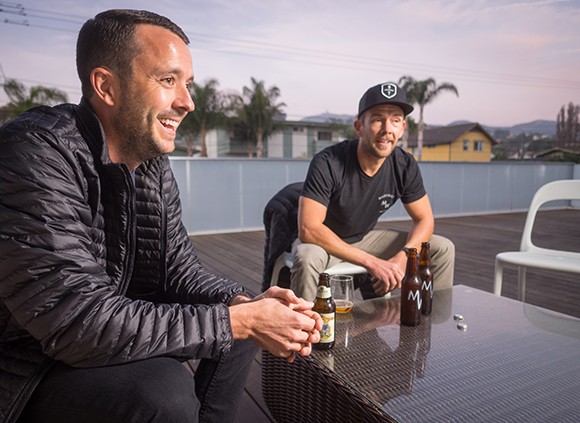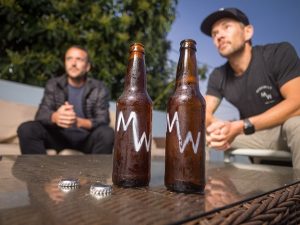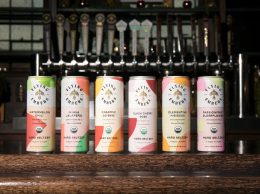Craft brew startups look for niches as capital bubbles up
IN THIS ARTICLE
- Latest news Topic
- Elijah Brumback Author
By Elijah Brumback Friday, March 13th, 2015

MadeWest Brewing Co.’s co-founder Seth Gibson, left, and head brewer Mike Morrison. (Nik Blaskovich / Business Times photos)
Thirty-five years ago, Ken Grossman cobbled together a micro-brewing system from old dairy equipment and in the process co-founded Chico-based Sierra Nevada Brewing Co.
Today, Grossman is the craft beer industry’s first billionaire and the once fledgling sector of brewing is definitely going mainstream.
For regional craft breweries such as Firestone Walker Brewing Co. and Figueroa Mountain Brewing Co., the focus is on churning out their flagship brews with consistency and increasing volume.
While experimentation with recipes, special releases and collaboration are still part of marketing the business, these tasks are not exactly the brewery’s focus once operations mature. It’s inevitable that when companies grow as exponentially fast as some craft brewers have — Figueroa has gone from producing just 900 barrels annually to an estimated 20,000 barrels since opening in 2011 — growth plans and sustainability efforts take precedent.
While jousting in the upper rungs of the craft beer industry is limited, the battle at the bottom is getting interesting.
The floodgates to the market remain open, especially in areas like the Central Coast that are stocked with untapped potential, access to capital and a young market.
No one is quite sure when craft breweries will reach market saturation — some believe that point doesn’t really exist. Others aren’t so optimistic, as acquisitions by major labels and private-equity start flowing into an industry that’s been defined by bootstrap financing and a brotherhood of independent maker idealists.
Bart Watson, chief economist for the Boulder, Colorado-based Brewers Association, said while the craft beer industry is still a relatively open playing field, winners and losers will be decided on strategy and execution.
“As always, it depends on your business strategy, but generally I think there is more competitiveness than ever,” Watson said. “This will vary place to place, as some areas still provide more growth opportunities than others.”
Enter MadeWest Brewing Co., the latest microbrewery venture to throw its hat into the South Coast craft beer mix. It’s also taking an untraditional approach, relying on business savvy and early scale to differentiate its product from others in a veritable breeding ground for new craft breweries.
 The newly minted Ventura company recently signed a lease for about 14,000 square feet of industrial space at 1744 Donlon St., and its owners are pushing to be up and running by late summer.
The newly minted Ventura company recently signed a lease for about 14,000 square feet of industrial space at 1744 Donlon St., and its owners are pushing to be up and running by late summer.
MadeWest is moving in just about a mile away from Surf Brewery, one of Ventura’s established craft brewers, which produces about 1,500 barrels annually. The 3-year-old brewery is currently in the process of modestly expanding its capacity to 3,000 barrels annually, taking it slow and steady. Bill Riegler, owner of Surf Brewery, previously told the Business Times that “straight-up demand” is driving the boom in business.
Because of that same boom, MadeWest wants to launch a 5,000-barrel-capacity system right away and lock down a distributor before the first batch is ready.
“When we originally started the concept about three years ago, what we had talked about doing was something pretty small. As I was putting the numbers together, it was doable on a small scale … but it wasn’t going to get us where we wanted to be,” said MadeWest co-founder Seth Gibson. “Our goal is to get on the production level sooner.”
Last December, Gibson executed a $500,000 private-equity offering and he is leveraging those funds to secure an additional $500,000. While Gibson admits the financing might not cover the entire startup cost, it should be enough to purchase equipment and get off the ground. Renovations to the property that will make way for a taproom, staffed with six to 10 employees, are also in the planning process with the city.
“We’re trying to make a run for it just a little above and beyond the bootstrap way of funding it,” Gibson said.
With so much interest in craft beer, Gibson and co-founder Mike Morrison were able to easily sell their vision for the brewery and closed the company’s first private-equity offering in three months despite not having a building or licensing. “We were really putting the cart before the horse,” Gibson said. “We just kind of gambled that everything was going to work out in our favor.”
The craft beer market is defined by companies making higher-quality products with better ingredients and unique flavors.
In the run-up to opening, Morrison, also MadeWest’s head brewer, is relying on nearly a decade of home-brewing experience and advice from some of the industry’s household names. He’s been talking with friends at Ballast Point Brewing Co. and Modern Times Beer in San Diego. Morrison will also spend several weeks in pseudo-apprenticeship for industry pals from both companies as they work to open a new brewery in Berkeley.
“It’s definitely a huge-scale difference,” Morrison said of the jump to production equipment. “There’s definitely going to be some dialing in.”
Watson said the beer lover is more educated and informed than ever before about what makes great beer, so there isn’t really time to “dial it in” once you open.
“You better be making great liquid from the get-go,” he said. “But more than ever, you have to be strategic and differentiate yourself from the crowd in some way — local appeal, quality of your products, unique attributes or business model.”
For now, both Gibson and Morrison are sticking to their day jobs but have every intention of transitioning the brewery into a full-time gig. The pair recognizes that competition in the craft beer space is rising, but remains confident they’ll have a long runway for growth in Ventura.
“Right now we’re fortunate to have the flexibility to work our normal jobs and do this. Asking ourselves if we’re willing to take a pay cut and risk everything to do this, that’s huge for us,” Gibson said.
Related Articles
 Monday, October 10th, 2022
Monday, October 10th, 2022










